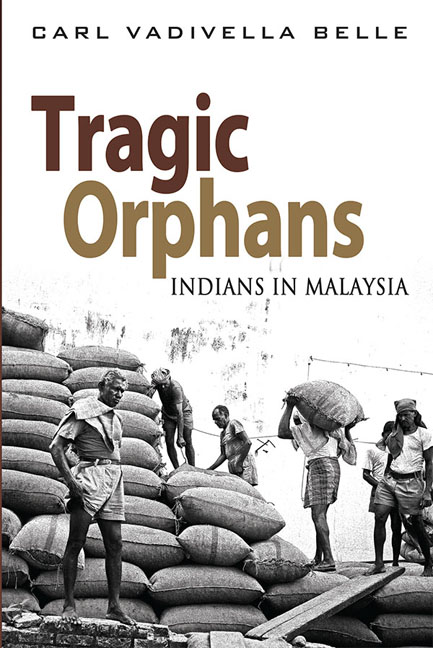Book contents
- Frontmatter
- Contents
- Acknowledgements
- List of Abbreviations
- Introduction
- 1 The Malay Peninsula: Early History, Melaka and the Colonial Setting
- 2 European Colonialism and the Malay Peninsula
- 3 India and the Development of British Ideologies of Empire
- 4 British Governance of Malaya
- 5 Slavery and Indentured Labour
- 6 Indian Indentured Labour in Malaya
- 7 Kangany Labour in Malaya
- 8 Other Indian Immigration
- 9 Indian Political Development to 1941
- 10 The Japanese Invasion, Subhas Chandra Bose and Indian Wartime Nationalism
- 11 The Post–war Period: Reform and Repression: 1945–48
- 12 From Federation to Merdeka
- 13 From Malaya to Malaysia: Singapore, 13 May and the New Economic Policy
- 14 The Mahathir Years: A Changing Malaysian Landscape
- 15 Abdullah Badawi, Islamization, and the Rise of Hindraf
- 16 Najib and 1Malaysia: A New Deal?
- Conclusions
- Bibliography
- Index
15 - Abdullah Badawi, Islamization, and the Rise of Hindraf
Published online by Cambridge University Press: 06 June 2017
- Frontmatter
- Contents
- Acknowledgements
- List of Abbreviations
- Introduction
- 1 The Malay Peninsula: Early History, Melaka and the Colonial Setting
- 2 European Colonialism and the Malay Peninsula
- 3 India and the Development of British Ideologies of Empire
- 4 British Governance of Malaya
- 5 Slavery and Indentured Labour
- 6 Indian Indentured Labour in Malaya
- 7 Kangany Labour in Malaya
- 8 Other Indian Immigration
- 9 Indian Political Development to 1941
- 10 The Japanese Invasion, Subhas Chandra Bose and Indian Wartime Nationalism
- 11 The Post–war Period: Reform and Repression: 1945–48
- 12 From Federation to Merdeka
- 13 From Malaya to Malaysia: Singapore, 13 May and the New Economic Policy
- 14 The Mahathir Years: A Changing Malaysian Landscape
- 15 Abdullah Badawi, Islamization, and the Rise of Hindraf
- 16 Najib and 1Malaysia: A New Deal?
- Conclusions
- Bibliography
- Index
Summary
Dato Seri Abdullah Ahmad Badawi succeeded Dr Mahathir as Prime Minister on 31 October 2003, having served as his loyal Deputy in the period which followed the sacking of Anwar Ibrahim. Abdullah was a wellcredentialed Islamic scholar who brought a mild and mannered approach to the conduct of public affairs. Initially Abdullah won wide support. He discarded some of Mahathir's more extravagant projects, offered no opposition to the Supreme Court ruling which quashed Anwar's sodomy conviction, and abandoned Mahathir's plans for a population of seventy million. He enunciated plans for tackling poverty and reinvigorating agriculture and rural development. His liberal approach foreshadowed greater freedom of expression. Following several high-profile arrests for corruption, Abdullah promised to curb abuses of power and to reform a police force notorious for its corruption and brutality. He introduced a programme of Islam Hadhari (Civilizational Islam), which appeared to be tolerant and moderate and which he proclaimed as the guiding lodestar of his administration. Asking Malaysians to “work with me, not for me”, Abdullah won a sweeping election victory on 21 March 2004 with BN claiming 199 of 219 seats. Abdullah was aided by an astonishingly inept campaign by PAS which openly supported Osama Bin Laden and Afghanistan's Taliban.
The 2004 election marked the apogee of Abdullah's leadership. Early in the second term the seeming reformist zeal which had led to his electoral triumph petered out and was replaced with hesitancy and indecision. Muhammad Takiyuddin Ismail and Ahmad Fauzi Abdul Hamid contend that from the very outset Abdullah faced near impossible obstacles. He lacked an established power base within UMNO and many of his Malay Cabinet colleagues were hard-line Malay nationalists. He was unable to develop patronage networks or deliver economic rewards to supporters within the party, and key reforms were opposed by influential elements within UMNO and the police. Abdullah was accused of protecting the business interests of his son, Kamaluddin, and son-in-law Khairy Jamaluddin, and of shrouding government decisions, especially the awarding of contracts, cumulatively worth billions of dollars, in secrecy. Moreover, Abdullah's Islam Hadhari did not translate to moderation at the grass-roots level, and he appeared to be both incapable and unwilling to impose any curbs on the more obvious excesses of Islamic bureaucrats.
- Type
- Chapter
- Information
- Tragic OrphansIndians in Malaysia, pp. 388 - 425Publisher: ISEAS–Yusof Ishak InstitutePrint publication year: 2014

